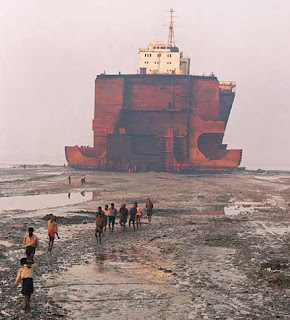

The breakers' yards at Alang, India.
.Since I've been whoring my travel blog here over the last few weeks and extolling the virtues of cruising, I wanted to bring to light the dark side of the shipping industry. I'm talking about the places ships of all types go to die. The breakers.
...
I went down to the water's edge. The Pioneer came looming out of the darkness, thrashing the ocean's surface with its single screw, raising a large white bow wake as it rushed toward the beach. I could make out the figures of men peering forward from the bridge and the bow. Now the sound of the bow wave, like that of a waterfall, drowned the drumming of the engine. A group of workers who had been standing nearby scattered to safety. I stayed where I was. Pandey joined me. The Pioneer kept coming. It was caught by an inshore current that carried it briefly to the side. Then the keel hit the bottom, and the ship drove hard onto the flooded beach, carried by its weight, slowing under full forward power until the rudder no longer functioned and the hull veered out of control and slid to a halt not a hundred yards from where we stood. Anchors the size of cars rattled down the sides and splashed into the shallows. The engine stopped, the lights switched off in succession from bow to stern, and abruptly the Pioneer lay dark and still.
...
Located mostly in India, Pakistan, and Bangladesh, the breakers' yards are an environmental nightmare. Chemicals, heavy metals, and fuel run from the dissected hulls and dollar-a-day workers slowly poison themselves working in the muck.
...
But the work slows when they come to the hull, where the steel is heavier and harder to cut. At that point, even for veteran workers, there must be a moment of hesitation at the audacity of the business. Using little more than cooking gas and muscle power they will tear apart this immense monolith, which towers above the crowds on the sand. It will take six months or a year to finish the job; men will be injured, and some may die. Almost all will to some degree be poisoned by smoke and toxic substances -- and more seriously, no doubt, than they would have been on the streets of India's cities. Nonetheless, the poor cannot afford to be timid.
...
Greenpeace has taken the lead in highlighting the situation but it doesn't look like anything will be done soon. It's a sad commentary on our society that the ships we use for fun and commerce end up poisoning the world's poor who merely try to carve out an existence.
Update:
Gord's note in comments made me think where I saw a story on this too. Found it:
No comments:
Post a Comment